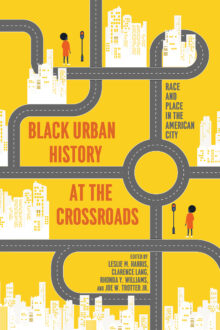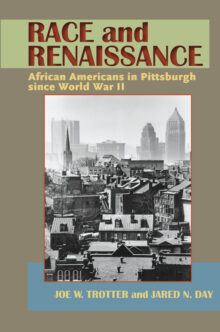

Joseph William Trotter Jr.
Joe William Trotter Jr. is the Giant Eagle University Professor of History and Social Justice at Carnegie Mellon University. He is the author of Workers on Arrival: Black Labor in the Making of America; Pittsburgh and the Urban League Movement: A Century of Social Service and Activism; and African American Workers and the Appalachian Coal Industry.
Black Urban History at the Crossroads
Race and Place in the American City
Drawing on significant recent scholarship on African American urban life over three centuries, Black Urban History at the Crossroads bridges disparate chronological, regional, topical, and thematic perspectives on the Black urban experience beginning with the Atlantic slave trade. Across ten cutting-edge chapters, leading scholars explore the many ways that urban Black people across the United States built their own communities; crafted their own strategies for self-determination; and shaped the larger economy, culture, and politics of the urban environment and of their cities, regions, and nation. This volume not only highlights long-running changes over time and space, from preindustrial to emerging postindustrial cities, but also underscores the processes by which one era influences the emergence of the next moment in Black urban history.
Race and Renaissance
African Americans in Pittsburgh since World War II
African Americans from Pittsburgh have a long and distinctive history of contributions to the cultural, political, and social evolution of the United States. From jazz legend Earl Fatha Hines to playwright August Wilson, from labor protests in the 1950s to the Black Power movement of the late 1960s, Pittsburgh has been a force for change in American race and class relations.
Race and Renaissance presents the first history of African American life in Pittsburgh after World War II. It examines the origins and significance of the second Great Migration, the persistence of Jim Crow into the postwar years, the second ghetto, the contemporary urban crisis, the civil rights and Black Power movements, and the Million Man and Million Woman marches, among other topics.
In recreating this period, Trotter and Day draw not only from newspaper articles and other primary and secondary sources, but also from oral histories. These include interviews with African Americans who lived in Pittsburgh during the postwar era, uncovering firsthand accounts of what life was truly like during this transformative epoch in urban history.
In these ways, Race and Renaissance illuminates how African Americans arrived at their present moment in history. It also links movements for change to larger global issues: civil rights with the Vietnam War; affirmative action with the movement against South African apartheid. As such, the study draws on both sociology and urban studies to deepen our understanding of the lives of urban blacks.


